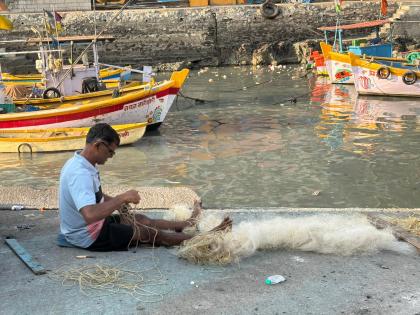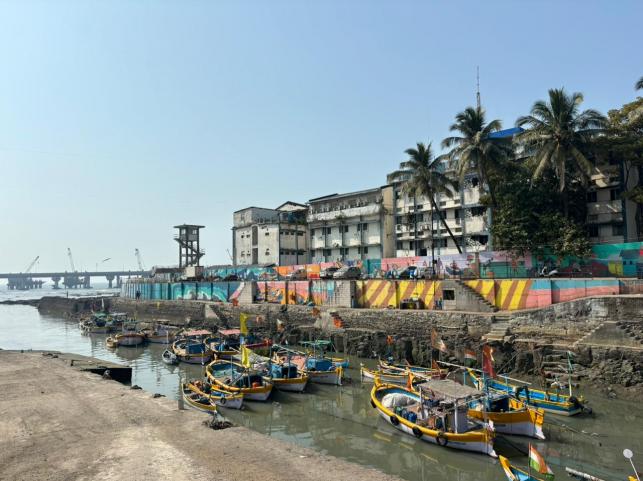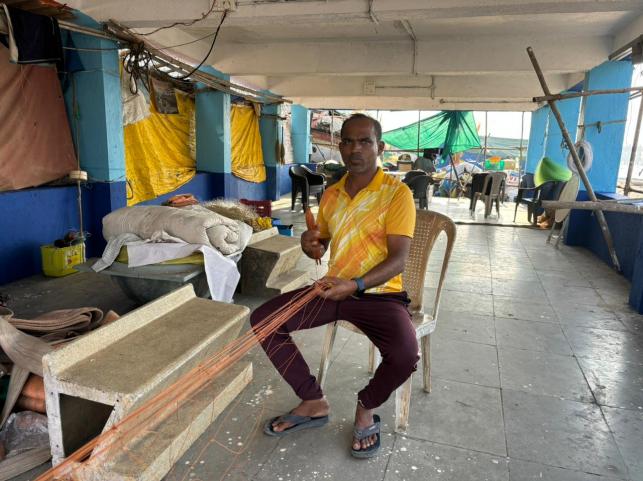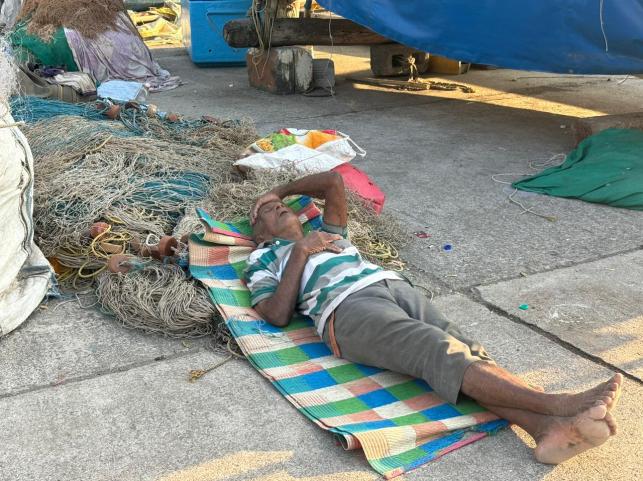Urban Development Sinks Mumbai Fishermen's Livelihoods
By Snehal Mutha | Updated: February 5, 2024 22:25 IST2024-02-05T22:17:25+5:302024-02-05T22:25:16+5:30
Nandkumar Koli, a seasoned fisherman voices the transforming challenges faced by his community due to urban development, "Pehilya Sarkhi ...

Urban Development Sinks Mumbai Fishermen's Livelihoods
Nandkumar Koli, a seasoned fisherman voices the transforming challenges faced by his community due to urban development, "Pehilya Sarkhi Maja Nahi (Fishing is no more like old times)," he said.
Nandkumar Koli is from Worli Koliwada and has been fishing for a livelihood for more than three decades. When Nandkumar expresses that it's no longer like old times, he is shedding light on how development has altered his source of income.
"Projects like the coastal road have been disrupting our livelihoods, which depend on fishing. If fish keep gradually diminishing in the water, and we have to go deeper into the sea to find them, tell me, how is it like old times?" said Nandkumar Koli.
Mahesh Koli, another fisherman, echoes the concerns. "With reclamation and construction activity, our catch near the coast has vanished. We got some compensation, but our livelihood is still in limbo. Earlier, for fish like shrimp, we need not have to deep drive into the sea; it was right at the shore. "That changed; we have to travel at least 3 to 4 km to get this fish. The same goes for prawns, pomfret, crabs, and more; earlier, a km was more than enough."
Fishermen at Cleveland Bunder also pointed to a study by the Tata Institute of Social Sciences showing a 50% decline in their daily income and a 27% increase in expenses. They also expressed that as Mumbai is developing, the coastline changing, and the fishermen are getting lost.
"The quality and quantity of fish both have decreased; nothing can compensate for that major impact on the fish catch. The land-filling work for the project has led to the destruction of important breeding grounds of a variety of fishes, which has resulted in a steep decline in the quantity of fish," added Nandkumar Koli.
Koli, who used to get at least 2 big cartons of fish, including exotic ones like lobsters, on one ferry, has seen a drastic reduction. He used to earn at least 10k for the lobsters, but that has dried up. Now one carton is also a big deal, which gets him Rs. 1000-1200.
The ongoing 22-km coastal road project has led to large swathes of land-filling along the coastline of the Arabian Sea since work began in 2018. All along the route of the construction, 10.6 kilometers from Marine Drive to the existing Bandra-Worli sea link. However, even as the nearly Rs 13,000-crore project promises to make road travel smoother and faster between south Mumbai and the suburbs, it has caused a crisis for the fisherman community in Worli.
The coastal project is not the only one; 12 years back, the Bandra-Worli Sea Link project also affected fishermen. Columns built under the Bandra-Worli Sea Link project replaced the generational fishing spots and affected the fish population beneath the Sea Link. “The pillars of the road would also threaten boats while venturing into and returning from the sea. The sea waves do not have a direction; they hit from anywhere, so a 60 meters navigation span was not enough between the pillars, so asked the government to increase up to 200 meters, said Sachin, a fisherman being in business for four decades.”
Brihanmumbai Municipal Corporation (BMC) in the Budget 2024 mentioned providing a 120-meter span between pillars and compensation for the loss of livelihood due to the coastal road project.
Compensation for boat owners has been distributed, but fisherwomen who sell the catch are still waiting due to bureaucratic delays. "Compensation has been given to boat owners; now only the women who sell fish are left; they will get the compensation with a 7% interest amount. Their compensation is stuck due to paperwork," said Vijay Patil, a member of Worli Nakhwa Matsya Vyavsay Sahakari Society.
Till five years back, Nandkumar's day used to start at 6 am by going on the ferry for fishing and end at 4 pm when he came back to the jetty. Today it ends by 11 am, or sometimes the day doesn't even start as he doesn't go fishing. "We had a lot to do in the waters; now it is no more like that. I have to sit for four months straight at home. On weekends I wait tables at a nearby bar and earn 1000/- per night." I have got compensation, which I used to pay off my loans, and the rest invested in my fishing business. Many fishermen have the same story to tell; they are juggling with multiple jobs.
Nandkumar had to do different jobs to cope up with hospital bills. He has two daughters and a wife; one of her daughters suffers from type-1 diabetes and the wife with a mental health issue, which brings him huge hospital bills.
Open in app

